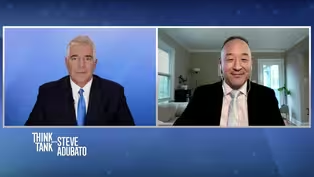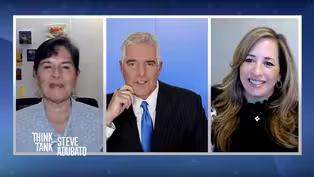
How media influencers are shaping news & impacting democracy
Clip: 2/8/2025 | 9m 33sVideo has Closed Captions
How media influencers are shaping news & impacting democracy
Jess Rauchberg, Assistant Professor in the Department of Communication at Seton Hall University, joins Steve Adubato to analyze how media influencers who are untrained in ethical journalism are shaping news and impacting democracy.
Problems playing video? | Closed Captioning Feedback
Problems playing video? | Closed Captioning Feedback
Think Tank with Steve Adubato is a local public television program presented by NJ PBS

How media influencers are shaping news & impacting democracy
Clip: 2/8/2025 | 9m 33sVideo has Closed Captions
Jess Rauchberg, Assistant Professor in the Department of Communication at Seton Hall University, joins Steve Adubato to analyze how media influencers who are untrained in ethical journalism are shaping news and impacting democracy.
Problems playing video? | Closed Captioning Feedback
How to Watch Think Tank with Steve Adubato
Think Tank with Steve Adubato is available to stream on pbs.org and the free PBS App, available on iPhone, Apple TV, Android TV, Android smartphones, Amazon Fire TV, Amazon Fire Tablet, Roku, Samsung Smart TV, and Vizio.
Providing Support for PBS.org
Learn Moreabout PBS online sponsorship- We're now joined by Jess Rauchberg, who's assistant professor in the Department of Communication Media and Arts at our higher ed partner, Seton Hall University.
Professor, good to see you.
- Thanks for having me today, Steve.
- All right, let's break this down.
You are saying after five years of research about what this influencer market is, that social media is more powerful than ever before, and dinosaurs like me in traditional media are about to get outta the business.
Is that what you're saying?
- I think that's part of a larger conversation.
It's not that people don't want to find information and they're not seeking that information out, but instead of turning to traditional sources such as news, print journalism or broadcast journalism or radio, they're now turning increasingly to social media platforms to find that information.
So as we saw in the 2024 election, it's not the news, but influencers who have podcasts or logs that are shaping how voters are choosing the ways they wanna participate in an election, and I think we're going to be seeing a lot more of that moving forward.
- Okay, let me ask you this, Jess.
As part of the public broadcasting family, We have guardrails in legacy media, particularly with public broadcasting.
What the heck are the guardrails with the influencers on social media that you're talking about?
- That's where the problems come in, Steve, because for the most part, these social media influencers and the content they're putting out, particularly about political events like an election, those are regularly unmoderated and there aren't the same guardrails.
So just because somebody might have a couple hundred thousand or even millions of followers in a really prominent podcast, doesn't mean that those same guardrails that exist in legacy media are there for the influencers in their podcasts.
But most people and audiences don't realize that.
So it becomes pretty dangerous when you are only tuning in to an unregulated podcast as opposed to a more legacy or traditional media source where those guardrails exist.
- Professor, let's try this.
What about if a whole range of my friends and their sons and daughters, disproportionately sons, they love Joe Rogan.
Joe Rogan tells them things and says things that they agree with.
So Joe Rogan must be right.
They must be right.
What concerns do you have that given the influencer market and the phenomena of influencers on social media, that people basically just search out people, listen, follow those who agree with them, so they must be right.
There's no other point of view, there's no devil's advocate.
There's no serious questioning, there's no challenging.
I must be right.
Joe Rogan agrees with me.
Go ahead.
- So that's a really big conversation that scholars of social media and journalism and media workers in traditional or legacy fields such as journalism alike, these are some questions we're wrestling with.
Podcasts hosts like Joe Rogan aren't trained as journalists.
They might have a background in communications, but they're more centered in the entertainment aspect.
And so now we're seeing as influencers are turning to, and people are turning to influencers themselves as sources of news, that there's now a conflation between media that's put out there for entertainment or some kind of enjoyable listening and information sharing that you might get from watching a broadcast on PBS or another network.
- So hold on.
I don't want to conflate things, but we just did an interview with... And by the way, check out this program with Robbie Parker, who's wrote this book, "A Father's Fight: Taking on Alex Jones, Reclaiming the Truth About Sandy Hook."
Robbie lost a 6-year-old daughter, Emily, in Sandy Hook.
Alex Jones, an influencer, back in 2012 said, these were actors.
The thing never happened, it was a hoax, and millions of people believed it.
Question, and then there's a court case you can follow what happened.
When it comes to truth, basic truth and responsibility, if Alex Jones or Joe Rogan, who did nothing like that, but says, "I'm an entertainer," where the heck is the accountability for anything that anyone does or says as a so-called influencer?
- That's where the problem lies, Steve.
I think that while we're placing a lot of power as audiences, or as the industry begins to adapt towards the role that influencers play, we need to take them seriously.
But that doesn't mean that we need to evaluate an influencer the same way as we would a journalist.
That said, most people and most listeners who are turning to influencers or news and for information about politics, that they don't recognize that difference.
And when the influencers themselves don't make that distinction, it makes a journalist's work so much more difficult.
And- - So, what should we be doing?
I'm sorry for interrupting.
Should we as so-called legacy media, be challenging those influencers for what they say and do?
How accurate it is or isn't?
Because if someone says, "I wanna listen to Rogan.
I wanna listen to..." And Dana White, I listen...
I love UFC, Ultimate Fighting.
But Dana White's an influencer in his own way.
I don't listen to him for what he has to say.
But the question becomes, doesn't everyone have a right to listen to whoever they want, whether they're right or wrong, responsible or not, truthful or not?
- Yes, I don't think we can make recommendations on you shouldn't listen to somebody.
But rather, we need to ask ourselves questions, why are we listening to them?
And does it make sense to listen to an entertainment influencer or somebody who's putting out content that isn't necessarily coming from a background in politics or journalism?
Do we value that the same way we would a politician or a journalist?
I think where legacy media's challenge lies, where that lies ahead is learning to adapt to the influencer industry.
It's not going away.
But we still need journalists.
We still need legacy media.
- What does that mean?
- Respectfully, Jess, what does that mean for those of us... And it's not about me.
Anyone who chooses to be a journalist, to ask serious questions, to deal in facts, to challenge and question respectfully, who doesn't have a point of view that they're putting out there.
What are you saying we should do?
Put a microphone in front of us and just say stuff?
- Well, some legacy media workers are turning in that direction, but that doesn't mean everyone needs to do that.
What I think we will see happen, and what I predict that where the industry's going to evolve over the next few years is that there might be adaptations to where journalists or legacy media workers are putting their information out there.
So it might not just be in an article or just a traditional TV broadcast, but maybe also putting some of that work onto social media platforms.
So it is reaching different types of audiences and they're getting different perspectives that aren't just Joe Rogan or Alex Jones.
- Before I let you go, do you believe this whole social media influencer thing, do you think that it's a bubble that is about to burst or just gonna get bigger?
- That has been a question that several people have asked me and I think we are at what a professor whom I collaborate with at Cornell University, Brooke Duffy, and I are calling the influencer tipping point.
For a decade, we didn't take influencers seriously, but now we are now encountering the fact that they're shaping our elections, they're shaping our politics.
It's no longer just about shopping or entertainment, but it's about how we participate in a democracy.
And so I think we need to pay more attention to influencers, and also we need to pay more attention to journalists who are actively working to provide accurate, truthful information about the implications of when we turn to influencers for not just entertainment, but also politics.
- Thank you, professor.
Appreciate it.
- Thank you.
- Say hello to our friends at Seton Hall University.
Go Pirates.
I'm Steve- - I will.
Do you need anything else from me?
- No, no, it's great.
It's the end of the show.
Unlike a podcast, I actually have an end time.
Thank you, professor.
- Excellent.
Take care, have a happy holiday and thank you so much, everyone.
- Same to you.
I'm Steve Adubato, We'll see you next time.
- [Narrator] Think Tank with Steve Adubato is a production of the Caucus Educational Corporation.
Celebrating 30 years in public broadcasting.
Funding has been provided by New Jersey Children’s Foundation.
Robert Wood Johnson Foundation.
Valley Bank.
Atlantic Health System.
The Turrell Fund, a foundation serving children.
NJ Best, New Jersey’s five-two-nine college savings plan.
NJM Insurance Group.
The Fidelco Group.
And by The Adler Aphasia Center.
Promotional support provided by Meadowlands Media.
And by New Jersey Globe.
- At the New Jersey Children's Foundation, we believe all children should have access to a high quality public education regardless of where they live.
We believe schools should place students on paths to success, and we invest in schools and educators who are meeting those needs.
Whatever your seat on the bus: student, parent, teacher, business leader, you have a role in our mission.
In Newark, district and charter schools show great education is possible.
We're working to unite people across the city and state to provide students with the schools they deserve.
Harry Lee talks about the state of charter schools in NJ
Video has Closed Captions
Clip: 2/8/2025 | 8m 26s | Harry Lee talks about the state of charter schools in NJ (8m 26s)
Sesame Workshop & their initiative "Little Neighbors"
Video has Closed Captions
Clip: 2/8/2025 | 9m 58s | Sesame Workshop & their initiative "Little Neighbors" (9m 58s)
Providing Support for PBS.org
Learn Moreabout PBS online sponsorship
- News and Public Affairs

Top journalists deliver compelling original analysis of the hour's headlines.

- News and Public Affairs

FRONTLINE is investigative journalism that questions, explains and changes our world.












Support for PBS provided by:
Think Tank with Steve Adubato is a local public television program presented by NJ PBS

